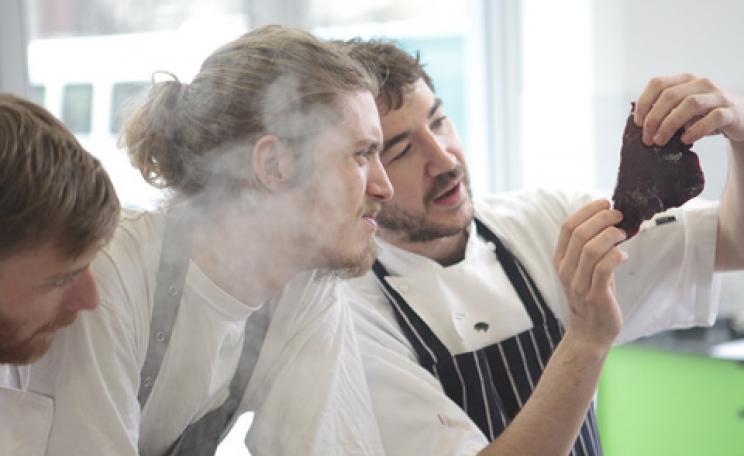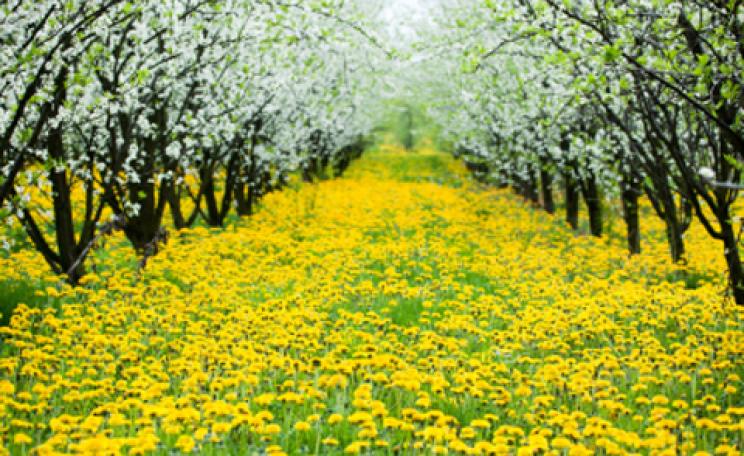The UK's biggest annual seed swap, Seedy Sunday, takes place in Hove on Feb 7. Seed swaps preserve our heritage varieties of fruit and vegetables and help subvert the domination of the seed industry by the multinationals.
Brighton and Hove's small-scale growers have been seed-swapping since 2002 when 350 people turned up to the inaugural do, a ramshackle affair held in a Kemp Town church. Since then it's moved to an art deco theatre and for the last two years the much bigger and more imposing Hove Town Hall.
Other swaps (see list below) tend to be smaller events held at allotments or community centres. Most take place around February in venues scattered from Stonebridge city farm in north west London to east Kilbride.
 Seeds of change
Seeds of change
Fran Saunders got involved with Seedy Sunday after the success of the first swap. Allotment-less, she has long been interested in growing in small spaces as is evident when you turn up on her doorstep, which is teeming with pots of every size.
'I've completed a Permaculture course and am interested in growing medicinal herbs. I confess to not being the greatest gardener in the world, and I'm learning all the time! Seedy Sunday helps and we're looking to do more in the community with workshops on seed saving, a possible seed bank and maybe even developing our own varieties.'
And how much does it cost to put the whole thing on?
'£2,500. We get Lottery money which has helped develop the website. Infinity Foods [organic produce retailer and distributor] sponsor the seed packets. We're keen to make it as accessible to everyone and not have high admission charges [entry currently costs £1.50]. It's run entirely by volunteers who give up their time because they believe in it so much.'
Any highlights/funny anecdotes from over the years?
'I think it was the second or third year a chap turned up with dope seeds and had a stall next to the city council! It's always an honour when Patrick Mulvaney, chairman of the UK Food Group, agrees to speak. His knowledge is immense.'
 A growing movement
A growing movement
Speakers this year include Vicki Cooke from the Heritage Seed Library, Mr Mulvaney and Richard Reynolds from the burgeoning Guerrilla Gardening movement.
'We hope that the people who come learn a little more of what is happening in the world in terms of food sovereignty etc,' Fran explains.
And it is in countries like Iraq, Peru or India where seed swaps take on an altogether different meaning. They are a way out of a spiral of dependency and debt, in which some farmers are tempted to buy expensive GM seeds on the promises of sales rep, only to discover they will only yield properly if sprayed with equally expensive, proprietary agrochemicals.
In Peru more local farming communities are kicking the habit and there are now more than 250 varieties of potatoes available in the country.
UK seed swaps have the same aims though; to defy the supermarkets with their bland, homogenized produce and protect our crop heritage by supporting local varieties of plant - some which are unregistered and therefore 'outlawed'.
 Seed guardians
Seed guardians
Why seed 'swaps'? Since the 1970s, to sell seeds the strain needs to be registered, costing a prohibitive £300 per year and £2,000 to register a 'new' one. Garden Organic run the Heritage Seed Library and get around the law by asking individual gardeners to become 'seed guardians' who pass around seeds for free to other members of the Library.
And this is pretty much what happens at Seedy Sunday where Hove Town Hall is jam-packed with - experienced herbalists, small-holders, allotment growers, tree nursery owners, permaculturalists, compost providers et al, together in the spirit of cooperation to pass on knowledge, give practical advice and, most importantly, seeds.
These are swapped or simply exchanged via donation. In return for a donation or in exchange for seed saved, potential growers can choose from hundreds of traditional fruit and veg crops. And by relying on open-pollination, these traditional varieties are better conditioned to local growing.
With the additional draw at Seedy Sunday of a café serving organic, locally produced food and drink, short films on growing, talks and numerous displays, the key is definitely to inspire people to go home and 'grow your own'.
When you think that today there are fewer than a dozen apple types readily available in the UK, down from 2,000 a century ago, it certainly makes sense.
And ask yourself, where else are you going to find a Nun's Belly Button? A convent? Nope - lettuce seed at a stall in Hove Town Hall.
Jan Goodey is a freelance journalist
Go to www.seedysunday.org for a full programme of the day's event (Feb 7 Hove Town Hall 10am-4.30pm £1.50).
Other seed swaps:
Arundel Agenda 21 Seed Swap
Sunday 28th February 2010, 1.00 - 3.30pm
Forest Row Seed Swap
Saturday 6th February 2010, 10am - 1pm
Hartfield Horticultural Society Seed Swap
Saturday 27th February 2010, 10am-2pm
Kew Bridge Eco Village Seedy Sunday
Sunday 14th February (Valentines Day!) 2010, 11am-3pm
Kingston's 2nd Annual Seed Swap
Saturday 6th March 2010
Seed Swap and Potato Day
February 13th 2010, 10am - 1pm
Seed Swap Herefordshire
20th February 2010, Saturday 10 am - 3 pm
Seedy Sunday Machynlleth/ Sul yr Hadau
Sunday 28th February/ Chwefror 2010, 10.30am - 4pm
Stonebridge City Farm Seedy Sunday
Sunday 28th Febraury 2010, 12- 3pm
Transition Horsham - Seedy Saturday
Saturday 13th February 2010, 10.30am - 2.00pm
Transition Tunbridge Wells Seed Swap
Saturday 13th February 2010, 10am - 12 noon
Trumpington Seedy Sunday 2010
Sunday 17th January 2010, 1.30-4pm
VegEvent 2010
Saturday 20th February 2010, 10.30am - 3.00pm
West of Scottish Seed Exchange Network Seed Swap
30th January 2010, Noon-3pm
Winchester Seed Swap
Winchester & Itchen Valley "Grow Your Own" Day, 7 March 2010, 10am until 1pm
| READ MORE... | |
 |
HOW TO MAKE A DIFFERENCE 10 resources for better food growing Food and farming is in crisis but there is hope for the future - from organics and Slow Food to permaculture and land share schemes |
 |
HOW TO MAKE A DIFFERENCE CASE STUDY: turning farmland into allotments Chyanhall Allotments in Cornwall has provided a successful model for farmers and landowners to generate income while providing a grow-your-own space for the community |
 |
HOW TO MAKE A DIFFERENCE CASE STUDY: growing fruit and veg in the city A host of communal vegetable gardens are springing up in the concrete heart of East London. Ben Willis meets the woman coaxing life from the urban jungle |
 |
REVIEW How to Make and Use Compost: The Ultimate Guide Drawing from 40 years of composting experience, Nicky Scott's latest book will inspire confidence in beginners and give new techniques to veteran composters |
 |
NEWS Private allotment company gets mixed welcome Private enterprise will increase the number of available allotment plots, but they will cost much more than their council subsidised cousins |








